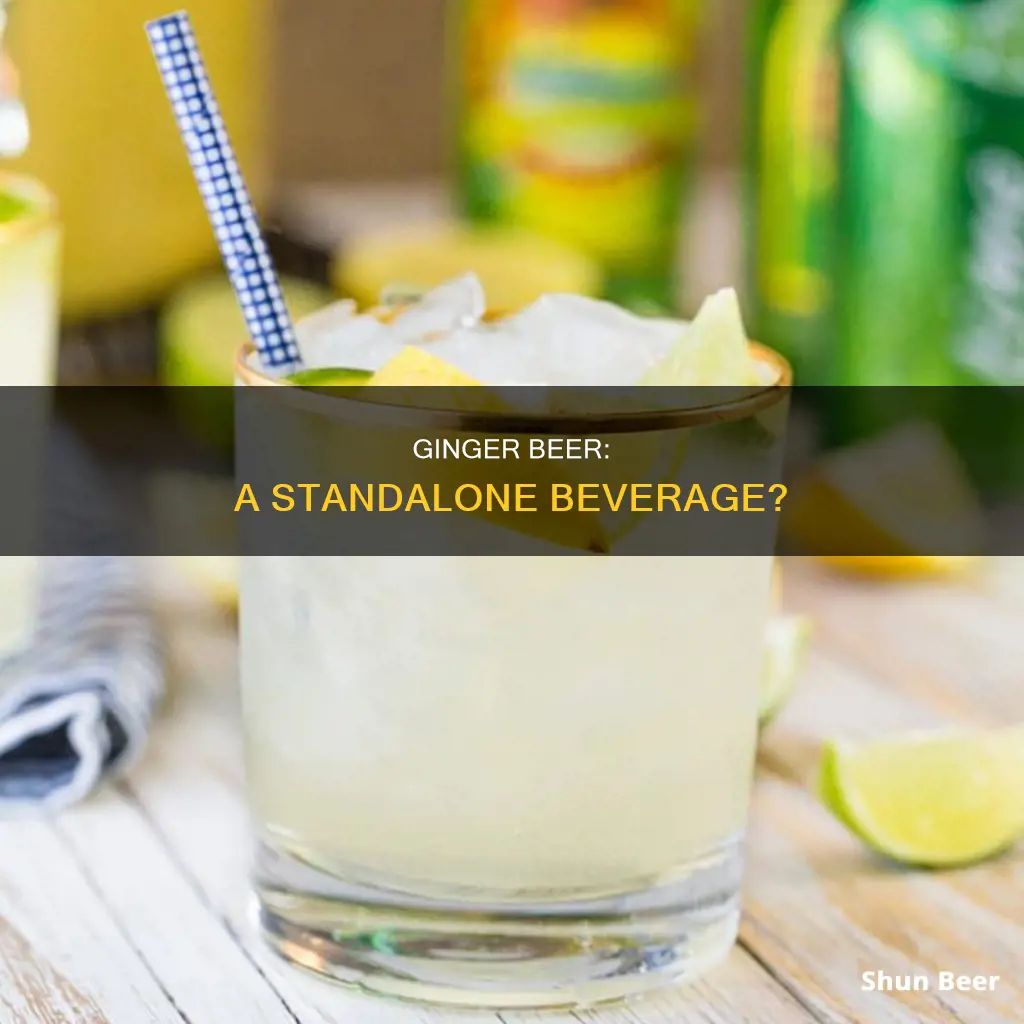
Ginger beer is a drink made from fresh or dried ginger, sugar, and lemon juice. It is often used as a mixer in cocktails, such as the Moscow Mule, but it can also be consumed on its own. There are two varieties of ginger beer: alcoholic and non-alcoholic. The non-alcoholic variety is commonly consumed by those who are designated drivers, or who are expected to drink in social situations but do not want to. It is also a good alternative for those who are avoiding caffeine, as it is naturally caffeine-free.
| Characteristics | Values |
|---|---|
| Taste | Stronger, spicier flavour than ginger ale |
| Mixer | Often used in cocktails, such as the Moscow Mule |
| Health benefits | May help with nausea and other stomach ailments |
| Alcohol content | Alcoholic and non-alcoholic varieties available |
| Cost | Significantly cheaper than alcohol |
| Availability | Most bars carry it |
What You'll Learn

Ginger beer is a stronger, spicier version of ginger ale
Ginger beer has a much stronger and spicier flavour than ginger ale. It is often described as having a "zingy, 'smack in the face' kind of flavour". This is because ginger beer is brewed using real ginger, whereas ginger ale is typically made by adding carbonated water to ginger syrup. The brewing process gives ginger beer its distinctive zesty taste.
The ingredients used to make ginger beer and ginger ale also differ. Ginger beer is traditionally made by fermenting ginger with sugar and then adding yeast to create an alcoholic drink. Modern ginger beers are often non-alcoholic and rely on carbonation for their bubbles. However, some small-batch producers may use brewer's yeast to develop the bubbles, resulting in trace amounts of alcohol (less than 0.5% ABV). Ginger ale, on the other hand, is typically artificially carbonated and does not contain alcohol.
Ginger beer and ginger ale also have different uses. Ginger beer is commonly used as a mixer in cocktails such as the Moscow Mule and Dark and Stormy. Its strong flavour adds a spicy kick to these drinks. Ginger ale, on the other hand, is a popular highball mixer and is often used in drinks like the Pimm's Cup or Presbyterian. It has a sweeter, more delicate ginger flavour that doesn't overpower the other ingredients in the cocktail.
So, while ginger beer and ginger ale share some similarities, ginger beer is definitely the stronger, spicier version of the two. Its unique flavour and preparation method set it apart from ginger ale, making it a popular choice for those who enjoy a bolder, more pronounced ginger taste.
Paleo Diet and Beer: Is It Allowed?
You may want to see also

It's a key ingredient in a Moscow Mule
Ginger beer is a key ingredient in a Moscow Mule, a cocktail that also includes vodka and lime. The Moscow Mule is typically served in a copper mug, which enhances the drink's coldness, although it can be served in a cocktail glass. The copper mug is also said to create a visually distinct presentation for the drink.
The Moscow Mule is a simple cocktail to make, requiring no tools. The ingredients are added to the mug or glass in the following order: ice, vodka, lime juice, and ginger beer. The drink is then garnished with a lime wedge or wheel.
The choice of vodka is not too important, as the ginger beer tends to dominate the other flavours. However, the choice of ginger beer can make a big difference to the taste of the cocktail. It is recommended to use a high-quality ginger beer with a strong ginger flavour and a good level of carbonation.
The Moscow Mule is a refreshing drink, perfect for hot summer days, but its strong ginger flavour also makes it holiday-appropriate. The cocktail offers a balance of spicy, sweet, and strong flavours.
There are several variations of the Moscow Mule, including the Kentucky Mule or Horsefeather (made with bourbon or whiskey instead of vodka), the Gin-Gin Mule (made with gin), the Mexican Mule (made with tequila), and the Jamaican Mule or Cuban Mule (made with rum).
Drinking Beer in Spain: What's Allowed in Public?
You may want to see also

It's a good non-alcoholic option when you're expected to drink socially
Ginger beer is a great non-alcoholic option when you're expected to drink socially. It's a stronger-tasting version of ginger ale, and it's widely available in bars and restaurants, often served in glass bottles. It's a good option if you're the designated driver, or if you simply don't feel like drinking alcohol but want to fit in with your friends. It's also a lot cheaper than alcoholic drinks, so you can save money while still enjoying a tasty beverage.
The drink has a strong ginger flavour, which can be a little overpowering for some, but it's a unique and refreshing change from regular soft drinks. It's also a good mixer for cocktails, so you can always add a spirit if you change your mind! Ginger beer is often used in Moscow Mules, for example, and pairs well with bourbon or rum.
Ginger beer has the added benefit of being good for your health. It's made from fresh or dried ginger, sugar, and lemon juice, and has been used for centuries to help with nausea and other stomach ailments. It can also provide relief from nausea during pregnancy, and is generally considered safe for both mother and baby. The drink has anti-inflammatory properties, can aid digestion, and may even have anti-cancer effects.
So, if you're looking for a non-alcoholic drink option that will make you feel included in social situations, ginger beer is a great choice. It's tasty, affordable, and has some impressive health benefits too.
Beer and Food Poisoning: Is It Safe to Drink?
You may want to see also

It's a natural source of antioxidants
Ginger beer is a natural source of antioxidants, which can help protect your body from damage caused by free radicals. The unique fragrance and flavour of ginger come from its natural oils, the most important of which is gingerol. Gingerol is a rich source of minerals such as magnesium, manganese, potassium, copper, and vitamin B6.
Ginger beer's antioxidant properties are largely due to the presence of gingerol, a powerful compound found in ginger root. Gingerol has been shown to have anti-inflammatory and antioxidant effects, which can help to reduce oxidative stress in the body. Oxidative stress is caused by an excess of free radicals, which can damage cells and lead to disease. By providing a rich source of antioxidants, ginger beer can help to neutralise these free radicals and protect the body from their harmful effects.
In addition to its high gingerol content, ginger beer also contains other active compounds that contribute to its antioxidant properties. These include shogaol, zingerone, and paradol, which work together to fight cancer cells and alleviate the inflammatory response in the body. The combination of these compounds makes ginger beer a potent source of antioxidants, offering protection against a range of diseases and promoting overall health.
The process of making ginger beer also preserves the antioxidant content of the ginger root. Unlike ginger ale, which is carbonated through the addition of seltzer water, ginger beer is brewed through fermentation. This process retains the natural ingredients and allows the beverage to maintain its high antioxidant content. As a result, ginger beer is an excellent way to enjoy the health benefits of ginger, including its high concentration of antioxidants.
The health benefits of ginger beer are not limited to its antioxidant properties. It is also known to aid digestion, relieve nausea, and even provide anti-cancer effects. However, it is important to note that the concentration of ginger in ginger beer varies among brands, and some may not indicate the ginger content. Therefore, making your own ginger beer at home or choosing a brand with a high ginger content, such as Bundaberg Ginger Beer, can ensure you maximise the health benefits of this delicious beverage.
Drinking Beer While on Probation: What You Need to Know
You may want to see also

It can be made at home
Ginger beer can be made at home, and it's an easy process that results in a drink that's healthier and more flavoursome than store-bought ginger beer.
The basic ingredients for homemade ginger beer are fresh or dried ginger, sugar, lemon juice and yeast. The first three ingredients are fermented with sugar, and then yeast is added to create an alcoholic ginger beer. However, you can also make a non-alcoholic version by adding seltzer water instead of yeast to create the carbonation.
Ingredients:
- 1 cup granulated sugar
- 2-4 tablespoons grated fresh ginger
- 1/8 teaspoon active dry yeast or brewer's yeast
- 3 tablespoons lemon juice, freshly squeezed
- 7 cups filtered water
- 1/2 teaspoon cream of tartar (optional)
Method:
- Combine the sugar, grated ginger and water in a saucepan over medium heat and stir until the sugar is dissolved.
- Turn off the heat and allow the mixture to steep for an hour.
- Strain the mixture (discard the ginger solids) and allow it to cool.
- Place a funnel in the top of a clean 2-liter plastic bottle.
- Sprinkle the yeast into the bottle, followed by the lemon juice and the sugar-ginger mixture.
- Put the lid on the bottle and shake until the yeast is dissolved.
- Stow the bottle on a shady shelf or in a pantry away from direct sunlight for 2-3 days, or until the desired level of fizz is achieved.
- Refrigerate the ginger beer to slow down the fermentation process and consume within 1-2 weeks.
Note: It is important to open the bottle every day to release the extra gas, as the built-up pressure can cause the bottle to explode.
You can also make a "ginger bug" or "ginger starter" by allowing ginger, sugar and water to ferment for 5-7 days. This releases the natural enzymes and probiotics of the ginger. This method takes longer but results in a beverage that is richer in probiotics.
Digital Beer Rebates: How Do They Work?
You may want to see also
Frequently asked questions
It's not weird to drink ginger beer alone, and it's a great alternative to alcoholic drinks when you're socialising. It's also a good choice if you're the designated driver.
Ginger beer has many health benefits, largely due to its key ingredient, ginger root. It can help with nausea, digestion, and may even have anti-cancer properties. It's also a natural source of antioxidants and can help with pain relief.
Ginger beer comes in both alcoholic and non-alcoholic varieties. The alcoholic type is traditionally made by fermenting the ingredients with sugar and then adding yeast. The non-alcoholic type gets its fizz from carbonation rather than fermentation.
Yes, you can make ginger beer at home using either fresh or dried ginger, sugar, lemon juice, and yeast. There are many recipes available online, and it's a great way to get the health benefits of ginger beer without any artificial ingredients.







